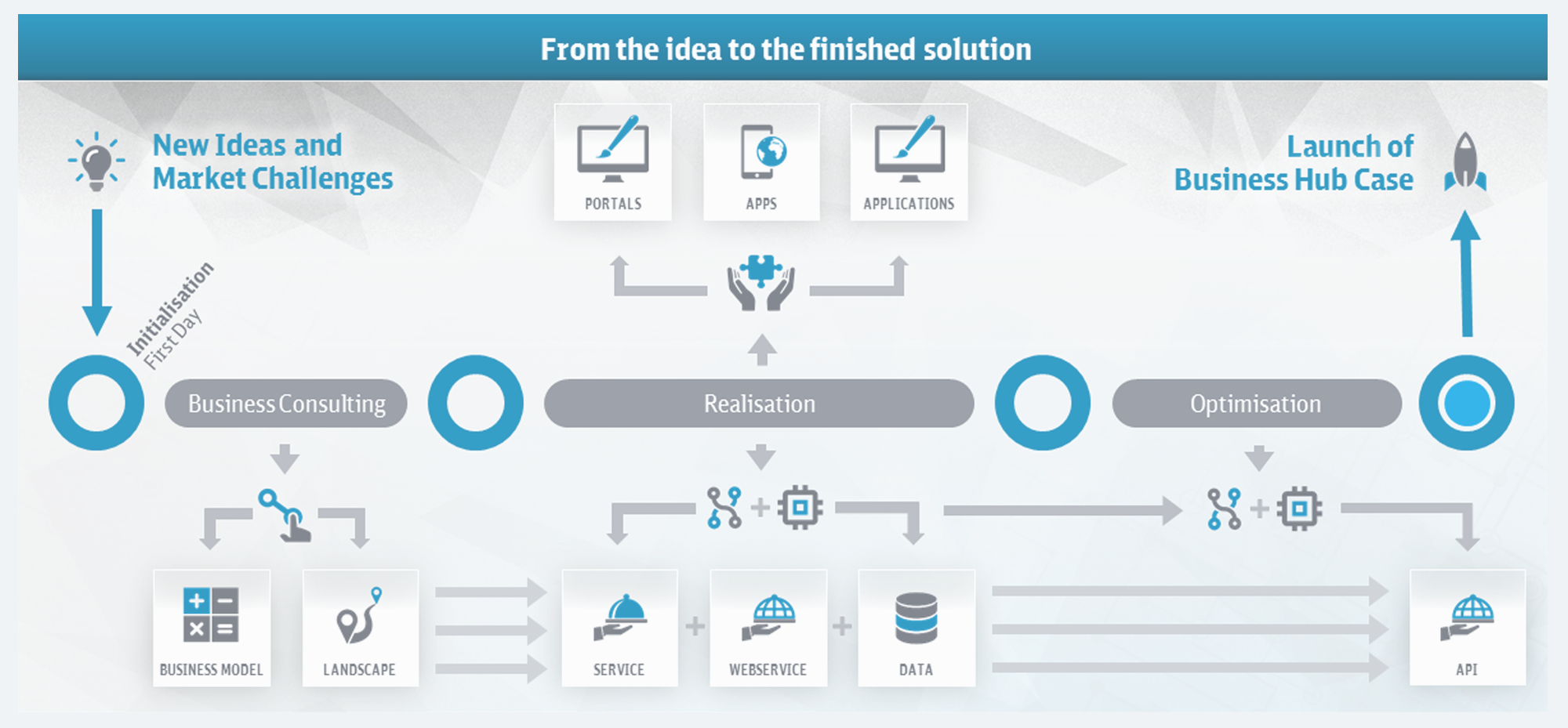Fast solutions with the Business Hub
Article: Digital building blocks for success
09/2018 – Business-oriented consulting and implementation: based on a modular development in a modular design, Group customers can now conveniently, affordably and quickly use internal and external services at DB Systel and offer the customer's own services on the market. The Business Hub as an integration platform allows new business models that are developed together with the customer – and is a driver of the digitalisation of the Group.
These days passengers, transport companies and other end customers expect DB to provide an improved user experience, integrated travel and transport chains as well as customised approach. No wonder – after all, many providers already offer all of this. For us to achieve this in the long term we need to utilise new digital technologies and services fast and flexibly. In the development of software, however, it is still common practice in many places to individually programme applications and services for customers. One single in/house supplier does it all. But as good as it sounds to develop customised customer solutions: this approach is costly and time-consuming.
This is where the Business Hub by DB Systel steps in. In future, all Group units will have the opportunity to connect or aggregate their services and data there. “As a result a market place for the sales and use of such data and services is created in the Business Hub“, Ian Knop, who is responsible at DB Systel for sales, marketing and Business Consulting explained. DB Systel develops and operates the platform in order to provide a growing ecosystem of services and APIs as an engine for digitalisation in the DB Group. In future it should be possible to offer a new, needs-based reference model for infrastructure or business-supporting services – no matter whether they are DB-internal or services from the open market.
One platform for all
Currently many Group units are building digital platforms. However, they often focus on their own organisations only. “They do attempt to create a common integration platform for services”, said Ian Knop. “But the individual departments’ platforms of the company parts are often not set up in such a way as to address a wider market. Nevertheless, many disruptive approaches on the markets show that there is no longer a competitive advantage in owning data without using it for as many application scenarios as possible. Just take a look at Google. Purely theoretically, it would be possible for the US company to also determine the delay data of trains from the positioning of Android smartphones – similarly to the way it already does for navigation in congested road traffic. Data can be obtained in various ways. If you are unlucky, another company will find a solution to get to this data without having given it to them. It is therefore a question of being quicker so that content and products can be marketed and therefore attain a market field that is as large as possible.
To ensure this is successful, the Business Hub has the goal of breaking up silos in the Group in future by offering solutions for end customers across various Group units. Furthermore, thanks to data and services these become internally and externally usable and thereby allow new data-driven business and usage-based pricing models. The desired result is also clear: the creation of digitalisation solutions without a technology focus, but instead new or improved business models, which can be developed together with the customer. This should generally ensure a higher level of customer satisfaction, but also bring very tangible sales increases. Above all, the Business Hub should offer customers the opportunity to keep up with the ever faster-changing situation on the market.

It is therefore a complete package that the Business Hub offers: via business consulting, implementation and optimisation finished solutions can be quickly, and independent of manufacturer, developed together or, optimally, orchestrated from existing components. Thanks to the technical expertise of DB Systel the right services for the platform are selected or, if necessary, further individually developed. DB Systel would like to become more of a partner for digital solutions with the Business Hub. The customers are supported to firstly identify these new business units and to make them visible to themselves. “We are backing models that are available for all and that our customers can add to with their particular expertise”, said Ian Knop.
"We are backing models for all in which our customers can use their expertise in their respective area."

DB Systel orchestrates the interplay of various services so that the customer, despite the use of standardised components, receives an overall package that is as individual as possible. “For example, together with DB Connect, we have developed the mobility budget service“, said Ian Knop. “There we also offered consulting with the business case and furthermore accepted costs for development. We are therefore directly involved in the success or failure of this solution.” A shortened time period between service development and positioning of the service on the market as well as increased flexibility in offering the combination of different services are the material objectives of the Business Hub. Via the portal customers can immediately determine whether the use of individual components costs them anything and, if so, how much. In turn, every business segment is given the opportunity to make self-developed services available Group-wide in a short period of time and therefore to monetise them for themselves.
All from one source
Customers benefit from further advantages: contractual matters for the use of the interfaces are already taken care of. And simply by common use of certain interfaces larger user figures are reached, which, in turn, reduces the costs for each individual one. All this would be near impossible in an individual development – especially not so quickly. This also shows that the actual focus of the Business Hub, alongside providing advice to our clients, is the reusability of services and the accompanying cost savings, plus initial costs can be significantly reduced thanks to suitable use-related transfer price models.
Using the Business Hub, a new model of collaboration between DB customer and DB Systel can therefore be established. Instead of developing completely new individual overall solutions as before, users of partial solutions now come into focus of the Business Hub. This means DB Systel will no longer just provide manpower for developments, but will successively become a solution provider or developer. “The Business Hub is to serve as a digitalisation platform for the entire Deutsche Bahn Group. We also want to accompany and drive a change in philosophy with it”, said Ian Knop.


